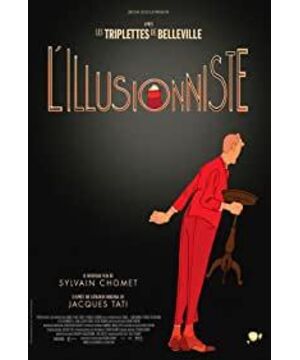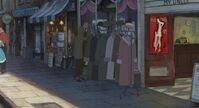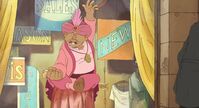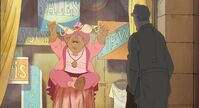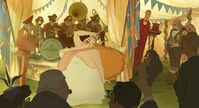Much has been said about the greatness and bitterness of fatherly love. Regarding the gap between ideal and reality, the ending song has already explained it very well. But maybe the presentation of the film and our thinking can be more complicated. Fathers present their children with the wonderful world of magic through their own hardships, and they themselves and bystanders often suspect this in their hearts. Will the child lack the ability to deal with reality because of the belief in the magical world? Is this effort worth it? Regarding the previous question, I think everyone thinks too much. I watched a TV series when I was a child, but I forgot the specific plot. I remember that the daughter in it said to her poor adoptive father that she felt the love of others because of how much he had and how much he paid. On the surface, what her adoptive father gave her was pitiful compared to her rich biological father. However, her adoptive father loved her much more than her biological father. The child is not actually that snobby. He can feel how much love his parents have given him, instead of judging it only on the surface. The worries of adults are but projections of our polluted minds.
There is a kind of love called doting. In fact, it is not all true love that can drown people. The inexperienced can also imagine that drowning is not a comfortable feeling, it is unbearable and makes one want to get rid of it. The extra unbearable part is deprivation and control in the name of love. Similarly, those deprivations in the name of frustration education are due to the lack of their own ability to love. True love is the water of the Dead Sea, and no amount will drown anyone. True love is a well that is always full, neither overflowing nor depleting.
Parents have paid so much for their children. If they don't know how to be grateful for Dade's feedback when they grow up, but wave their sleeves and live their own lives, leaving their parents alone in the sunset, is the old man too aggrieved? I have a friend who said that he doesn't understand the grievances and resentments of those who like to be fathers. If it was him, he would treat the flesh and blood of others as his own. I once wondered if this friend was an alien abandoned baby. However, he said, if you have a child just to love him, and you have nothing else to ask for, does it make any difference if you are born yourself? I thought so. If we have a child just to love him, we will not care whether he is grateful and how much he can give back to us. If we have a child to give him enough protection and nourishment so that he can become the whole of himself, rather than to meet our own needs and expectations, we will not feel wronged and worthless for our efforts. We gave birth to him and raised him just to love him. We have nothing else to ask for. Just love. Simple love can’t be wrong, it won’t be too much, it won’t be enough, it won’t be unworthy.
Children who have grown up with such love will not have the ability to mourn the beautiful fairy tale world, will not have the ability to adapt to reality, and will not fail to love their relatives. The adult world shown in the film is full of hardships, unbearableness and helplessness. In fact, there is no need to be so pessimistic. The adult world has the benefits of the adult world. Although hard, we can feel our power when we use our "magic" to turn our hopes into reality. Even though it is unbearable, when we love, we can feel the value of life. Although there are many regrets in the real world, if we have the ability to mourn our once perfect ideal world, we can accept her imperfections and feel her beauty. Happiness requires ability, and this ability comes from a person who has been simply loved, and a person who can love this simply is not happy?
View more about The Illusionist reviews


